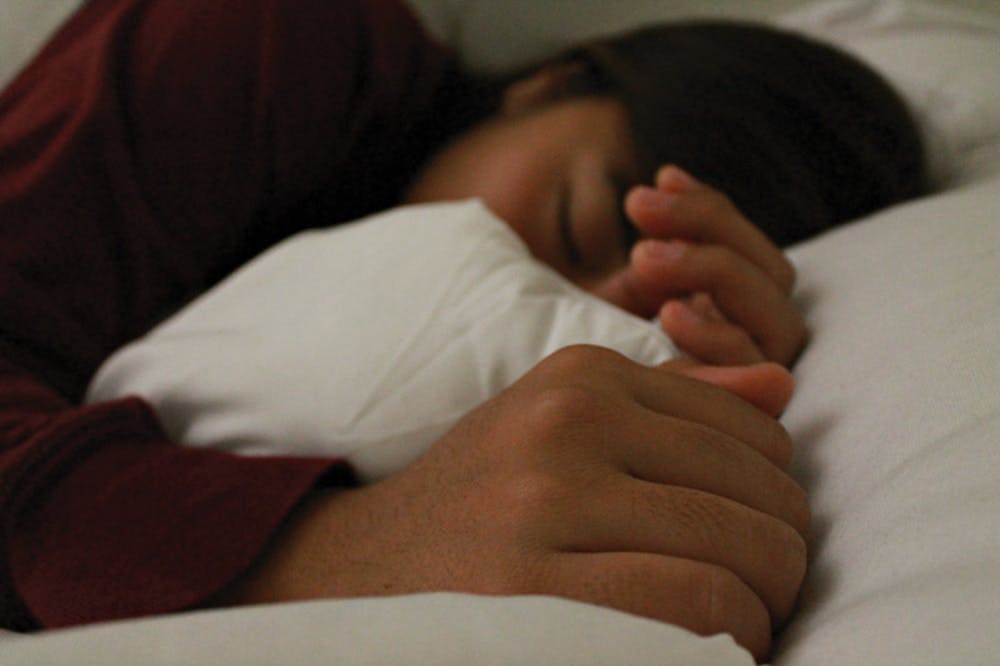For the past five years, Professor of Psychiatry and Human Behavior Mary Carskadon has been watching students sleep.
Carskadon has been observing first-year sleeping habits to study the way changes in sleeping patterns during the college transition influence students’ lives. Members of the class of 2017 will be the study’s final participants unless her lab receives additional grants, Carskadon said.
Leaving home to attend college “opens the potential for vulnerability or resilience, and we think that sleep may play a role in how things play out after this major life event,” Carskadon said. She said she became interested in the relationship between sleep and resilience after reading a paper about rats with abnormal sleeping schedules.
Between 280 and 300 first-years participate in the sleep study each year — by the end of this semester, there will be around 1,200 students in the sample, Carskadon said.
The lab refers to this six-hour testing phase as “Spit Night.” This year, it will be held Nov. 1 and 2. Students participating in the study come into the lab around the time they would normally fall asleep, but instead of sleeping, they stay up to spit.
“We’re looking for when the brain says, ‘Aha, it’s night time,’ and we know that when it starts producing melatonin,” Carskadon said. Her lab has found a relationship between a person’s sleep schedule and his or her melatonin signal. This finding is detailed in a study currently under review.
Students may also opt to sleep at Butler Hospital’s sleep lab for two nights. Prior to their visit, participants must wear an actigraph, a device worn like a watch that measures activity levels, for a week, wrote Clare Kim ’15, who participated in the study as a first-year, in an email to The Herald. She wrote she had to check in each night to demonstrate she was maintaining a regular sleep schedule.
“You couldn’t take naps, which was horrible because it was spring break,” she wrote. “And you weren’t allowed to sleep anywhere but your own bed.”
Carskadon cannot discuss the specifics of the lab’s findings because she does not want to influence current participants in the study, but she did note they are looking at sleep, mood, anxiety and eating as well as the relationship between weight and sleep.
This year, Carskadon is also looking at the relationship between genetics, epigenetics and sleep, she said.
Carskadon said she is considering the possibility there exist genetic cues to a person’s resilience or vulnerability following major life changes “in the context of sleep.”
She said she plans to analyze the data from the past five years following the conclusion of this stage of the study. Her findings may help explain the influence sleep plays in a person’s daily life and may point to the broader life effects of sleep cycle changes during a student’s first year of college.
“I’m going to bed later and waking up later,” said Caitlin Richard ’17, noting that the fact that classes start later in college than in high school has pushed back her sleeping schedule.
She added that her sleep habits are also affected by her dorm’s noisiness. “I have ear plugs and a noise machine and a face mask,” she said. “I can never really sleep with other people in the room.”
Meryl Charleston ’17 also said she has had difficulty dealing with the greater amount of ambient noise.
“The noise is really different from what I’m used to at home,” Charleston said. “People in my dorm stay up routinely until 3 (a.m.).” She said she slept less than five hours each night this weekend.
Lack of sleep “really shortens my attention span and stresses me out,” she said.
But Stefania Gomez ’17 said she has not been suffering from sleep deprivation.
“Today, I didn’t have class until 1 (p.m.). I can make up a lot of sleep during the week unlike during high school,” Gomez said. She added that she prefers working on homework late at night. Because she stays out late more frequently than in high school, Gomez said her homework schedule is much later.
Carskadon’s research, which will likely conclude at the end of this year, may shed light on the broader effects of these sleep trends. She said she also hopes to follow up with previous participants in the study to see the way sleeping has influenced them since their first year of college.
“It’s a big project, and it’s been wonderful,” she said. “We get good science out of it, but we also have fun doing it.”

ADVERTISEMENT




